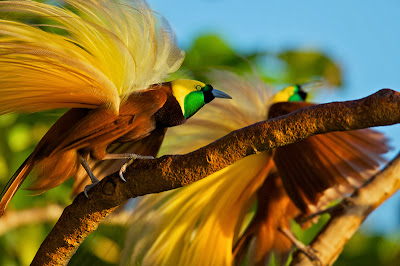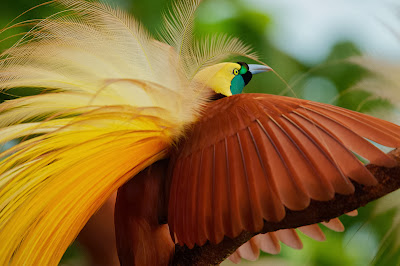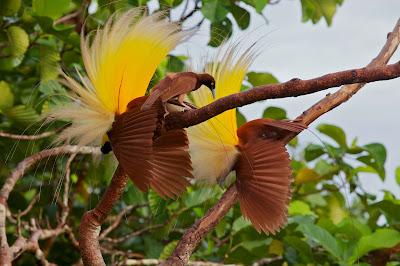 |
| Paradisaea Apoda |
The Greater Bird of paradise is
a Bird which bleongs to Paradisaea
family. Carolus Linnaeus named this Bird of paradise (Paradisaea apoda). Paradisaea is a Latin word which means paradise,
and the word Apoda also extracted from Latin, that means footless or legless, this guided to the disagreement that these
birds were beautiful tourists from paradise that were kept high by their quills
and never came over to the earth until death. It is named so because its first trade skins taken to Europe were
organized with legs removed. Greater
bird common name opposes its bigger size
with the similar but smaller, Lesser bird of paradise. |
| Paradisaea Apoda |
Behaviour:
The
Greater Bird of paradise is the largest member in the genus Paradisaea, with males average measured length is up to
43 cm (excluding the long central tail wires). While the adult female
length is measured at only 35 cm. This spcies plumage is also sexually dimorphic. The adult male has yellow head (not yellow as
in lesser bird of paradise), brown back underparts and brown wings, an
iridescent green throat, central wire tail feathers and yellow glossed thready flank
feathers.
 |
| Paradisaea Apoda Mating Rituals |
The rest of the body plumage is maroon-brown. The flank plumes, used
in displays, are yellow at the bottom, changing white and striped with maroon.
The female has shades of maroon brown plumage all over. In both male and female
the iris is yellow and the beak is blue. This species is Polygynous. Adult males use traditional tree show perches in lekking system, with upto 15 adult
males on a single lek, plus females plumaged younger males. Adult male concisely holds
wings in front of body and throws flank quills over back then jumps up and back
along perchrising and lowering the beak on each turn.
 |
| Paradisaea Apoda |
Habitat:
The
Greater Bird of paradise is spread out to lowland and hill forests of southwest New
Guinea and Aru
Islands, Indonesia.
The greater bird of paradise food consists mostly of fruits, seeds and small
insects. A small population was recognized by
Sir William
Ingram in
1909-1912 to Little
Tobago Island of West
Indies in
an attempt to save the species from extinction due to overhunting for plume trades.
The introduced populations survived until at least 1966, but
most likely are fading now.
No comments:
Post a Comment